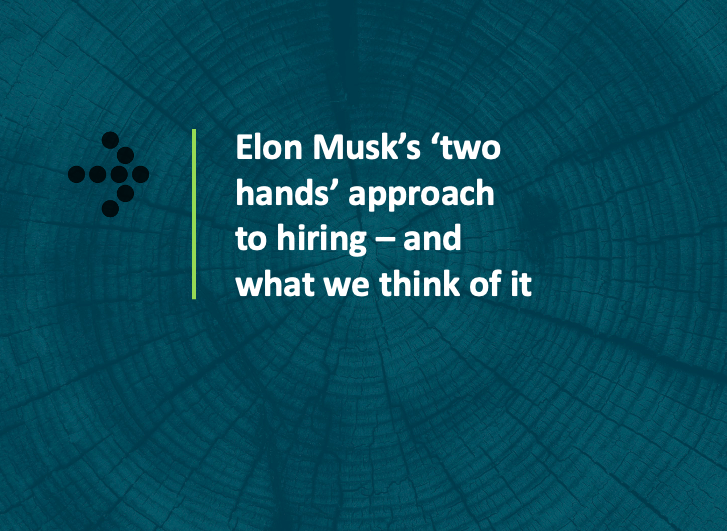Elon Musk’s ‘two-hands’ approach to hiring – and what we think of it

A recent article in Inc.Africa, Elon Musk’s Brilliant Hiring Strategy Uses The ‘2 Hands Test’–Instead of Degrees, author Kelly Main unpacks Musk’s approach to hiring, which famously discredits traditional education as means to fielding and finding top talent.
“College is basically for fun and not learning,” Musk has been known to say.
Rather than calling for degrees or other qualifications, Musk’s companies, Tesla and SpaceX, rely on what they call the “two hands test”, which “… qualifies candidates through first-hand experience and hands-on expertise testing.”
We put the concept to a few Evalex team members and asked for their views on the “two hands” approach. Here’s what they said:
Kevin Distiller, Odyssey Talent Management MD
In the new world of work, knowledge is fluid. The important thing to establish is whether the candidate has the capacity to adapt, learn new things and apply knowledge to new situations. Culture fit and potential are also key. In emerging economies, there may be reasons people haven’t been able to attend the best colleges or universities – so assessing for potential is a better way to sift the right candidate.
Our assessments provide an integrated view on the “why you do what you do, whether you can do what you want to do, and how good you are at doing these things” – we can assess what the person actually does when faced with leadership tasks, not just what they perceive they can do.
David Bischof, Director: Business Development
I was particularly drawn to the paragraph in the article that reads, “To test candidates effectively, give tests (e.g., a task or assignment) that most closely match what the role itself may encounter. To yield an accurate measurement of one’s ability to effectively perform the position’s tasks, be sure that the test’s scope is limited to the resources necessary to perform said test or task.”
This talks to the need for employees to understand their job purpose, and what constitutes “meaningful work”. It also calls for alignment with the company culture.
Evalex is able to meet this requirement through our acute understanding of just not the prerequisites of a job, but also the organisation, its culture and leadership styles. Furthermore, our focus is not just on providing information related to current job fit, but also identifying potential for the future to help individuals grow in a business and for accurate placement.
Wille van Tonder, Lead Consultant
Real life, first-hand experience is a form of education – and in some cases, the best education! Practical experiences and the application of skills are sometimes better than theory or knowledge. Through our business simulations, candidates are given tasks or assignments that are closely related to the role they’re applying for. In this way we can monitor how the person performs them in real life, rather than in theory.
Truly understanding how something works, is much more important that memorizing it or repeating information.
Ramona Naidoo, Consultant
I recently watched a video where the CEO of Mindvalley, Vishen Lakhiani, discredits the need for traditional college degrees – from a technological advancement perspective, what you learn during those three to four years is possibly obsolete by graduation.
From a youth perspective, and within the backdrop of a country where education is not free, this approach could change the game for young, talented youth who just lack a formal, tertiary education. This would open doors to more job opportunities, as long as they show up and demonstrate their skill. In a perfect world, it would mean people would be in jobs sooner, and more youth would be considered.
In summary, we are very much aligned with Elon Musk’s view that hands-on skills testing matters a lot. As market leaders in leadership simulations, we cannot agree more. In fact, our research has shown that the assessment of behaviour and skills through simulations are a very strong predictor of competence and potential.
It goes without saying that an integrated and holistic approach of using both psychometric and simulation or “skills” assessments should yield powerful information for recruitment, development and potential initiatives.